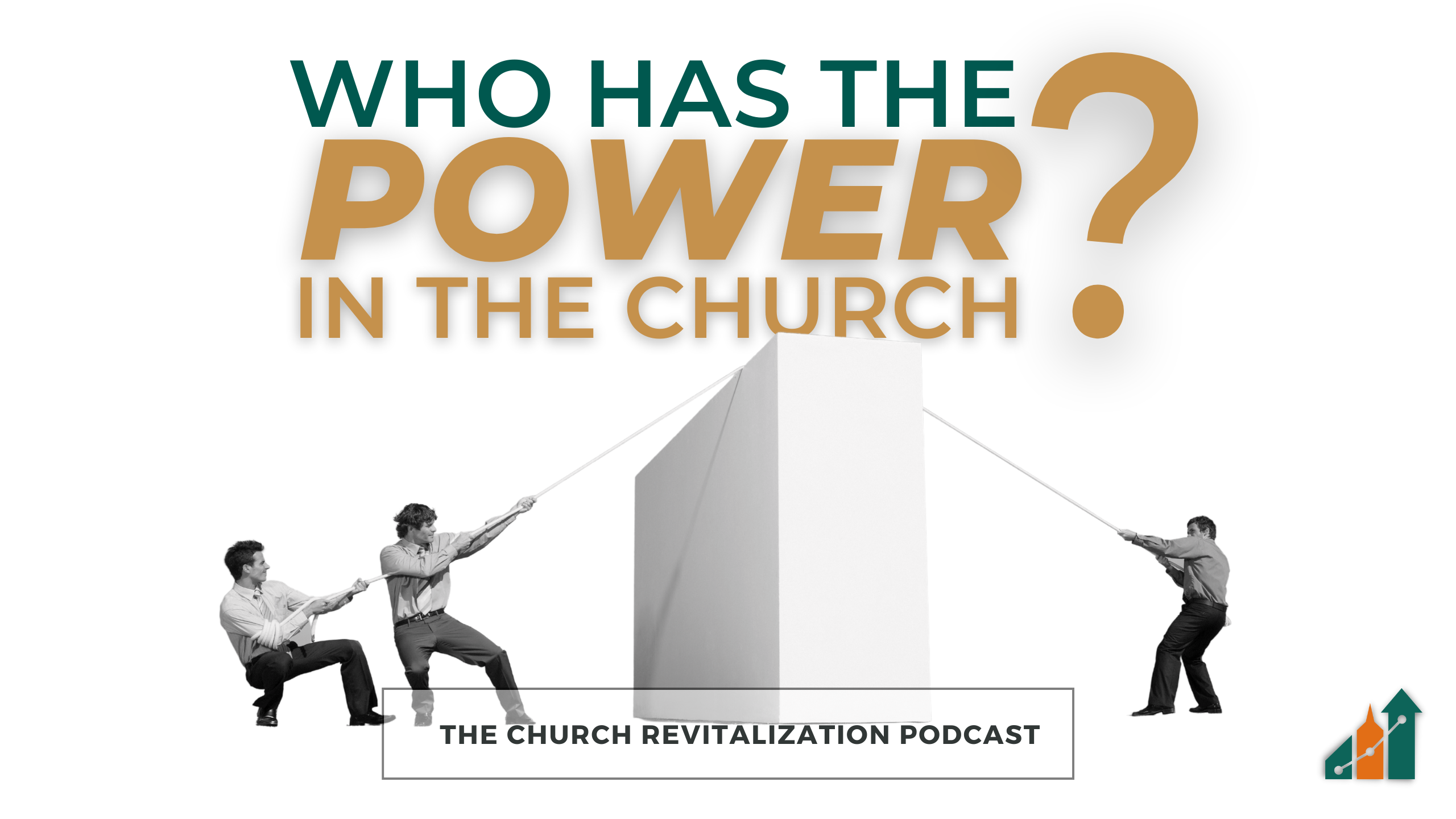The Church Revitalization Podcast – Episode 194
Originally published in the book Leading Leaders by Dr. Aubrey Malphurs
Church leadership boards as well as others in the church must be aware of individual and corporate power and the roles that each plays in church leadership. The implications of these will be seen in the section below on two scenarios for handling power.
Individual power is power that is held by an individual in the ministry. (It could be personal or position power.) The individual exercises that power when leading others. For example, the senior pastor exercises individual power as the designated leader of the church. Some other leader in the church has individual power to lead his or her ministry within the church (Heb. 13:17). A negative example is when some person, such as a board member or congregant, attempts to exercise individual authority over the senior pastor.
Corporate power is exercised by a group, such as a church board or an entire congregation. When a board makes a decision corporately or a congregation votes on some issue as a whole, they’re exercising their corporate authority. This kind of power usually has precedence over individual power. Thus a board acting corporately would have power over a senior pastor. A congregation acting corporately would have authority over a governing board in a congregationally ruled church.
Subscribe below to never miss an episode.
The Church’s Relationship to Power
Power resides in every church whether it wants it or not. The important question is how the church, whether universal or local, should handle its power as it seeks to influence people for God. The answer is church polity. Polity concerns whom the church empowers. It answers the question, Who has the authority to exercise power in the church? No less than three major types of polity or government have surfaced over the years—episcopal, presbyterian, and congregational.
The Bishops Have the Power
The episcopal form of polity or government is hierarchical. It places the power to influence in the hands of bishops. Churches that practice this form of government follow a threefold ministry hierarchy, which includes bishops, presbyters, and deacons. Only the bishops have the power to consecrate other bishops and ordain priests and deacons. Thus the bishops hold the power in this system. Some people attempt to trace this authority back to the apostles (apostolic succession).
There is biblical support for presbyters or elders as well as deacons (1 Tim. 3:1–10 and other passages); however, the office of bishop appears to be the same as the office of elder, as we saw in chapter 4, not a separate office with superior power over the others. Consequently, the episcopal form has little biblical support. This polity is practiced primarily by the Methodist, Orthodox, Anglican, Episcopal, and Roman Catholic churches.
The Elders Have the Power
The presbyterian form of polity is federal—it places the power to influence in the hands of certain leaders, often called elders. A number of churches that practice this polity are governed by a session that is composed of two kinds of elders. One is the ruling elders. They’re laypeople who are elected by the congregation. They assist in the government of the church. The other is a teaching elder. This person is the pastor or minister who is ordained by other ministers. The teaching elder is responsible to minister the Word and sacraments to the church. Other churches have variations of this format, such as a board of lay elders with one elder who serves as a teaching elder.
There is ample scriptural support for this form of government. Elders are involved as leaders throughout the New Testament (Acts 11:30; 14:23; 15:2, 22; 20:17; Titus 1:5; James 5:14; and 1 Peter 5:1). In 1 Timothy 5:17, Paul refers to the elders at Ephesus who “direct the affairs of the church.” They are worthy of double honor, especially those who also teach and preach. Apparently some ruled, and others ruled and also taught. However, as we saw in chapter 4, this is likely a reference to the city church made up of these elders who were likely the pastors of house churches located all over Ephesus. Some would use 1 Thessalonians 5:12–13 and Hebrews 13:17 to argue that congregants should submit to the elders. These two passages may be referring to elders, but they don’t identify the leaders as such.
This polity is practiced primarily by Presbyterian and Reformed groups, as well as by some independent and Bible churches. Most hold that both classes of elders are of equal ministries and have equal authority in the church.
The Congregation Has the Power
The congregational form of polity gives power to the congregation to exercise influence over its affairs. Churches that practice this polity emphasize that the church is to be a democratic community that vests ultimate authority in the membership or congregation. They acknowledge Christ as head of the church. They often elect ministers to lead them who theoretically have no more power than any other member of the congregation. They also elect boards (elder, deacon, and other) to lead and conduct much of the church’s business.
A primary argument for a congregational polity is the priesthood of the believer (1 Peter 2:5, 9). Another argument uses the passages that imply that congregations made decisions in certain situations (see Acts 6:3, 5; 15:22; 2 Cor. 8:19). The congregation’s involvement in church discipline (see Matt. 18:17; 1 Cor. 5:4–5) is another argument for congregational polity.
This polity is practiced by Baptists and numerous other denominational and independent churches.
Who Should Have the Power?
The logical question to ask next is, Which form of polity is the biblically correct view? However, it would be better to ask if there is a specific, biblically correct form. The congregational and presbyterian forms appear to have the most biblical support. The question comes down to whether Scripture prescribes one form over the other. As we saw above, both positions appeal to specific passages of Scripture that seem to validate their particular form. However, Ryrie accurately observes that, “The New Testament picture seems to include a blend of congregational and federal government, limited to the local level.”
This would seem to indicate that Scripture doesn’t validate a particular polity. Apparently, the early churches embraced various structures within the federal and congregational forms for handling power that conformed best to their unique circumstances. That is likely why we see a blending of the two forms. Thus it would appear that churches today are free to choose their polity, as long as it conforms to clear prescriptive passages and doesn’t violate Scripture. In short, Scripture leaves it up to each church to determine its own structures for handling power and authority. Consequently, each church is free to determine how it will structure itself to deal with power and its potential abuse.
Two Guiding Biblical Principles
In addition to the passages above regarding the federal and congregational views, there are some other biblical principles that can help churches structure themselves as they attempt to handle their power. Scripture prescribes that people obey their leaders. In Hebrews 13:17 the writer says to the people: “Obey your leaders and submit to their authority. . . . Obey them so that their work will be a joy, not a burden, for that would be of no advantage to you.” This passage is clear that the leaders in the church, whether elders or others, have authority and that followers are to obey them as leaders with authority.
Another principle is that it’s wise to pursue the counsel of others. In several places, Proverbs encourages believers to seek the advice of several people, because there is wisdom in learning the viewpoints of others (Prov. 11:14; 15:22; 20:18; 24:6). The point is that all of us are wiser than one of us. Thus I would argue that churches would be wise to have good, godly, competent governing boards. I’ll say more about this below.
Two Scenarios for Handling Power
The federal and congregational views, or a combination, have the most biblical support and, at least in the West, represent the polity of most churches. The following presents two scenarios for the distribution of power in each. The advantage of both is that they clearly spell out the lines of authority between the board, the pastor, and the congregation as well as achieve a reasonable balance of power.
The Congregational Scenario
The congregational scenario places much of the power in the hands of the congregation. However, the congregation may only exercise that power corporately, such as when it comes together to vote on some issue. The congregation might vote on the board members and pastor once a year. No individual congregant has individual power over anyone else, including the senior pastor and staff.
The board has corporate power to act on behalf of the congregation. If the congregation doesn’t agree with the board’s decisions, it can vote out all or some of the board members at its next official meeting. Regardless, no board member has individual power over anyone else. (An exception is when he or she is leading a ministry within the church. Then he or she would have some individual authority over those in that ministry—Heb. 13:17.)
The senior pastor is a board member with one vote that he exercises when the board acts corporately. He also has individual power over board members, staff, and individual congregants as the congregation’s recognized leader (Heb. 13:7, 17). Other leaders in the church would have some individual authority over those who minister under them. However, neither the pastor nor other leaders have individual power over the congregation as a whole.
The Federal Scenario
The federal scenario places much of the power in the hands of the board that selects its own members, not in the congregation. The idea is that the most spiritual, godly leaders in the church serve on this board. However, they may only exercise their power corporately as a board. No board member may exercise individual power over the senior pastor or staff. (They may have individual authority over congregants that are part of a ministry they might lead.)
The pastor should be on the board but has only one vote like any other board member when making corporate decisions. However, as the senior pastor and leader of the church, he has individual power over individual board members, the staff, and the congregation (Heb. 13:7, 17).
The congregation has no corporate or individual power. While it may have many godly members, it also has those who are uncommitted, carnal, and possibly some unsaved people who shouldn’t be involved in making decisions that affect the spiritual vitality and future of the church. This scenario has the most biblical support.
Watch this episode on YouTube

Dr. Aubrey Malphurs (1944-2022) was the Founder of The Malphurs Group and a retired senior professor of leadership and pastoral ministry at Dallas Theological Seminary. Dr. Malphurs was an award-winning author of more than 25 books with titles focusing on strategic planning, leadership development, and organizational strategy.

